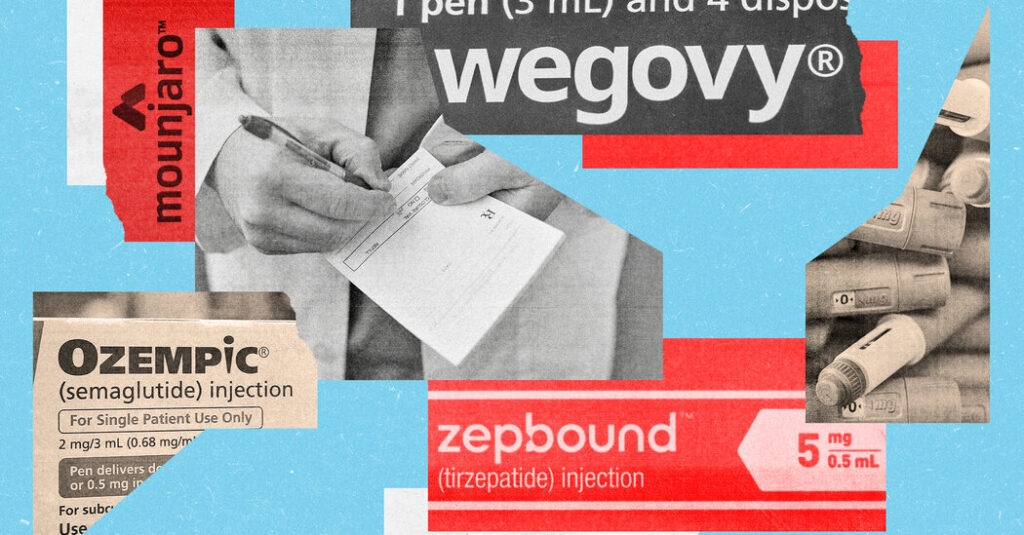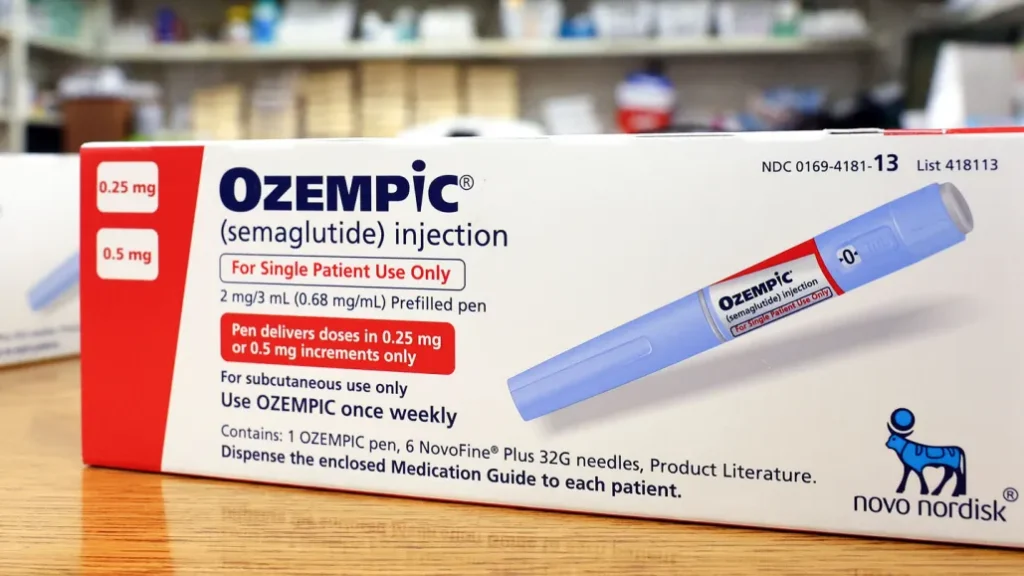My last blog and podcast I talked about obesity in this country, and how significant the problem is. It is an epidemic. What I did not talk about was the solution to the problem. I did not outline any proposals to effectively deal with the obesity problem.

Beyond the obvious actions of more exercise and eating a better diet, is there anything else?
The answer is yes. Yes, indeed — anti-obesity medications/treatments; weight loss drugs.

Ozempic, Zepbound, Wegovy, and other weight loss drugs are classified as GLP-1 receptor agonists. These medications mimic a hormone called GLP-1(glucagon-like peptide-1), which helps regulate blood sugar levels, appetite, and insulin response, leading to weight loss.
Those of you that follow me know that I am intrigued by words that I have not run across before. And the word agonist is a new one for me.
An agonist is a substance (typically a drug or a naturally occurring molecule) that binds to a specific receptor on a cell and “turns it on” or activates it, mimicking the action of a naturally occurring substance in the body.

The key ingredient in both Ozempic and Zepbound that makes them effective for weight loss is semaglutide. Semaglutide is a GLP-1 receptor agonist. Here’s how semaglutide works:
- Appetite Suppression: Semaglutide interacts with areas of the brain that regulate appetite. It essentially “tells” your brain that you are full, reducing hunger and food cravings. This makes it easier for individuals to eat less without feeling deprived.
- Slows Gastric Emptying: It slows down how quickly food leaves the stomach, which helps you feel fuller for longer after eating. This extended satiety further contributes to reduced calorie intake.
- Blood Sugar Regulation: GLP-1 also stimulates insulin secretion and helps control blood sugar levels, which is why semaglutide is used for treating type 2 diabetes. Stabilized blood sugar levels can also reduce food cravings, especially for sugary foods.

Semaglutide has been shown to significantly reduce body weight in clinical trials. By helping people feel full sooner and for longer periods, it encourages lower caloric intake, leading to weight loss when combined with proper diet and exercise.
I can speak about this from personal experience.

I was diagnosed with a pre-diabetic condition one year ago. The prescription was to inject each week Ozempic into my body. I did this for 6 months and the results were amazing. I lost 25 pounds. I did this while keeping my same exercise and diet routine. I had no apparent side effects.
The good news here is that there are now drugs available that can dramatically reduce weight and, if taken widely, would significantly reduce the obesity epidemic that we have in this country.
The bad news is that (1) these drugs are in short supply and not readily available plus (2) they are outrageously expensive, and Medicare and most insurance companies will not cover any or all of these costs.
Again, sadly, I have some personal experience with this bad news. During the last six months of 2023 I was able to get Ozempic and to get Medicare, my health plan, to cover a significant portion of the monthly cost of Ozempic.
The way I was able to get Ozempic is that I was diagnosed as a pre diabetic; I was not able to get Ozempic for weight loss. My monthly out of pocket cost was approximately $200, which I considered to be wonderful since the cost of the drug is approximately $1,300 per month!
But, then in January of 2024 Medicare changed its policy to no longer pay for a portion of the cost of Ozempic for pre diabetics. Medicare continues to pay for the drug for diabetics, but not for pre diabetics or for weight loss.
All of a sudden in January, I am facing $1,300/month to continue my Ozempic. Needless to say, I stopped using Ozempic because of the cost. As a result, I regained the 25 pounds and then some.
But this story is not about me. It is about how do we make these drugs available to the 50+% of Americans who are obese.
Here is what we need to do – the Peterson Plan.
First and foremost, the President and Congress should declare obesity as a national health emergency. Similar to the priority that we are giving cancer in this country, we should do the same with obesity. A national priority, the equivalent of a “moonshot”.
Second, the following policies should be implemented:
- Exert Regulatory Pressure for Price Reductions: The U.S. government could increase pressure on pharmaceutical companies to lower the prices of these drugs. This could involve reforms that allow Medicare to negotiate drug prices directly, which is currently restricted.
- Expand Insurance Coverage: Advocacy for changes in insurance policies could make obesity medications more widely covered. Insurers tend to classify these drugs as lifestyle medications, but lobbying for recognition of obesity as a serious, chronic disease would help.
- Develop Generic Drugs and Allow Compounding: Encouraging and speeding up the process for generic versions of these drugs could help lower prices. Generic medications are usually much more affordable, and this could help make them accessible to more people.

- Since there is a clinical need that cannot be met by FDA-approved drugs, instruct the FDA to allow compounding. Compounding pharmacies could indeed provide a potential solution to the high cost and limited supply of obesity medications like Ozempic. These pharmacies can create “copycat” versions of these drugs by combining active ingredients tailored to individual patient needs. This will create competition with the name brand weight loss drugs and as a result drive prices down.
- Permit Cross-Border Healthcare Solutions: Patients sometimes look to international mail-order pharmacies or travel to other countries for cheaper medications, although there are regulatory hurdles. Pushing for policies that allow for easier importation of FDA-approved drugs at lower prices could alleviate costs for Americans.
The same drugs that cost $1,300/month in the USA cost $200/month in Europe!
- Provide Subsidies or Financial Assistance: Programs offering subsidies for those who can’t afford these medications should be developed.

The Reverend Al Sharpton has said “It’s fair to say that if obesity has a stranglehold on America, it has a death grip on Black America. Almost 60% of Black women are living with obesity, which kicks the door wide open to hundreds of other related conditions, including Type 2 diabetes, cardiovascular disease, stroke and high blood pressure.”
Third, the Federal Government should take two actions immediately.
- The Food and Drug Administration (FDA) should approve these drugs for weight loss.
- Medicare should cover the costs of these weight loss drugs.
Fourth, keep an eye out for scams.
There is a lot of misinformation out there and it is important to focus on legitimate, evidence-based treatments for obesity.
- For example, Keto Gummies are popular because they provide a convenient, easy-to-consume supplement that aligns with the low-carb, high-fat principles of the keto diet. There has been a popular rumor floating around that Keto Gummies were featured on Shark Tank, and that all the sharks invested in them. However, this claim is untrue. No such product has ever appeared on the show, and there has not been an episode where all the sharks jointly invested in a single weight loss product like Keto Gummies.

- Unfortunately, once again, I can relate to this since I fell for the scam. I am a big fan of Shark Tank, and when I heard that its well-known investors as a group had invested in Keto Gummies, I immediately purchased some, hoping to lose weight as advertised. I have taken them for one month and have not lost one pound.
Fifth, here is how we pay for this over the next 20 years.
Estimating the cost to the U.S. Treasury for allowing Medicare to pay for Ozempic and similar weight loss drugs over 20 years, as well as the potential savings from reduced healthcare costs related to obesity, involves a few key assumptions:
Cost of Medicare Coverage for Weight Loss Drugs:
- Drug Price: Ozempic and similar drugs currently cost around $1,300 per month in the U.S., although lower-cost versions could emerge over time. If Medicare were to cover the cost, it would need to negotiate or reduce prices significantly, potentially bringing the cost closer to the European price of around $200 per month.
- Number of Beneficiaries: As of now, about 44 million people are enrolled in Medicare, and estimates suggest around 42++% of adults in the U.S. are obese. Assuming a portion of this population would qualify for weight-loss drugs, perhaps 15% to 20% of Medicare recipients could use these medications.
A rough calculation:
- 15% of 44 million Medicare beneficiaries = 6.6 million people.
- If each person used a weight-loss drug costing $1,300 a month, that would amount to $1,300 × 12 months × 6.6 million people = $102.96 billion per year.
- Over 20 years, the cost could be about $2 trillion—assuming no price reductions or shifts in usage. With negotiated pricing down to $200 a month, the cost might drop to around $300 billion over 20 years.
Estimated Savings from Reduced Obesity:
- Obesity-Related Health Costs: Obesity is associated with a range of health conditions, including diabetes, heart disease, and stroke. The CDC estimates that obesity-related medical costs amount to about $173 billion annually. If widespread use of weight loss drugs reduces obesity by even a modest percentage, significant savings could be realized.
- Potential Savings: If obesity rates were reduced by 10%, the potential savings could be $17 billion per year in direct medical costs. Over 20 years, this would amount to about $340 billion in savings. A more significant reduction in obesity, say 20%, could lead to savings of over $680 billion in health costs over 20 years.
Net Impact on the U.S. Treasury:
- Total Drug Cost: $300 billion (if negotiated prices for drugs were achieved).
- Healthcare Savings: $340–$680 billion (depending on the extent of obesity reduction).
In the best-case scenario, the U.S. could save more in healthcare costs than it would spend on covering these drugs, potentially leading to a net savings of up to $380 billion over 20 years. Even in a conservative scenario with less price negotiation and smaller reductions in obesity, the program could largely pay for itself or come close to breaking even.
Sixth, and finally, how do we sell this to the American public and to Congress.

The President should frame the investment in obesity medications as critical for national defense, drawing a parallel to how President Eisenhower sold the interstate highway system in 1954, some 70 years ago.

Here’s how this approach could be effective:
- Obesity as a National Security Threat:
The obesity epidemic directly affects military recruitment. A growing percentage of young Americans are ineligible to join the military due to obesity and other health-related issues. If the pool of eligible recruits continues to shrink, it could undermine the readiness of the U.S. armed forces. Just as the interstate highway system was essential for troop movement and national defense, improving the health of potential recruits could be vital for maintaining a strong military.

- Economic Argument:
Framing this issue as an economic one would resonate well. The rising healthcare costs associated with obesity, alongside its impact on military readiness, create a dual threat: strained public health resources and compromised national security. The investment in medications like Ozempic could be sold not only as a health initiative but also as a national security measure to ensure that the country has a healthy and capable military force.
- Historical Parallels with Public Health:
The U.S. has a history of addressing public health challenges as national priorities. From efforts to eradicate polio to public campaigns against smoking, investments in public health have had broader societal benefits, including safeguarding national security. By emphasizing that obesity is a major threat to military preparedness, a president could rally support for Medicare coverage of obesity medications as a critical defense strategy.
- Appealing to Broader Audiences:
This approach could also appeal to a wider audience beyond military circles. By positioning obesity treatment as an investment in the nation’s future—through lower healthcare costs, improved worker productivity, and stronger defense readiness—it could gain bipartisan support. The issue becomes less about individual lifestyle choices and more about securing the future strength and safety of the nation.
A president selling the investment in obesity medications as essential to national defense would echo Eisenhower’s successful framing of infrastructure as a defense imperative, providing a compelling rationale for public and political support.
I rest my case – the Peterson Plan to fix obesity in the United States.
Hi I agree with you if you need help call or email me
Sounds good until the other shoe drops in a few years when the damage of merely relying on et another drug can cause an individual. For the elderly, no problem but putting 13-50 year olds who live on hot dogs, cheetos pizza, confections and soda while playing video games rather than getting exercise is unhealthy. Limiting just what can be purchased with food stamps or on any government assistance program to wholesome food would go a long way in changing the rampant obesity trajectory.
Impressive Plan and presentation! How to push it?